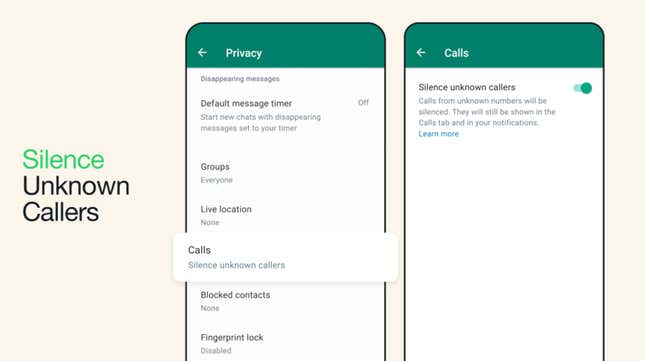WhatsApp Releases ‘Silence Unknown Callers’ Feature
WhatsApp introduced a new automatic call-silencing feature intent on targeting potential spam calls this week. The feature, plainly dubbed “silence unknown callers” in the WhatsApp settings menu, is bringing another layer of protection to calls and messages from unknown numbers to combat an increase in unwanted calls.
The new addition, which rolled out worldwide on Tuesday, will “automatically screen out spam, scams, and calls from unknown people,” WhatsApp said in a news release. WhatsApp users in India were reported to be among those most affected, receiving an average of about 17 spam calls per month, a 2021 Truecaller report found, according to Reuters.
In response to rising spam complaints, Meta’s new feature is designed to increase protection to provide more control over users’ incoming calls. The unknown calls will not ring on WhatsApp, but will instead be redirected to the user’s call list, where the user can still see the missed call, in case it was misidentified as spam.
The company is pairing its Silence Unknown Callers feature with Privacy Checkup, also launched today, which will navigate the user through steps to secure their messages, calls, and personal information.
The change comes after reports that more than 500 million users had complained of an influx of spam calls from international numbers, especiall from countries with area codes +251 (Ethiopia), +60 (Malaysia), +62 (Indonesia), +254 (Kenya), and +84 (Vietnam) in recent months.
Meta did not immediately respond to Gizmodo’s request for comment, but a WhatsApp spokesperson told TechCrunch, “Bad actors find different ways to scam users. International scam calls is a new way that bad actors have recently adopted.”
The Federal Trade Commission reported in 2022 that the top five scams are from those who pose as online shopping scams, propose seemingly real business and job opportunities, report on investment opportunities, and offerings of prizes, sweepstakes, and lotteries. The FTC reported it received 2.4 million fraud reports last year, citing that Americans lost roughly $8.8 billion last year, anincreasing by 30% over 2021.
In response to the influx of spam calls, India’s Minister of State for IT, Rajeev Chandrasekhar, said at the Public Affairs Forum of India last month that he was sending a notice to Meta about the massive surge in incoming spam calls, local media outlet Mint reported. “I have said repeatedly that openness trust, safety, and accountability are the responsibility of platforms who deliver to digital nagriks [digital citizens],” he said.
Meta believes its new security additions will reduce the current amount of spam calls by at least 50%, telling TechCrunch, “We expect to be able to control the current incident effectively. We will continue to work relentlessly toward ensuring a safe experience for our users.”
WhatsApp introduced a new automatic call-silencing feature intent on targeting potential spam calls this week. The feature, plainly dubbed “silence unknown callers” in the WhatsApp settings menu, is bringing another layer of protection to calls and messages from unknown numbers to combat an increase in unwanted calls.
The new addition, which rolled out worldwide on Tuesday, will “automatically screen out spam, scams, and calls from unknown people,” WhatsApp said in a news release. WhatsApp users in India were reported to be among those most affected, receiving an average of about 17 spam calls per month, a 2021 Truecaller report found, according to Reuters.

In response to rising spam complaints, Meta’s new feature is designed to increase protection to provide more control over users’ incoming calls. The unknown calls will not ring on WhatsApp, but will instead be redirected to the user’s call list, where the user can still see the missed call, in case it was misidentified as spam.
The company is pairing its Silence Unknown Callers feature with Privacy Checkup, also launched today, which will navigate the user through steps to secure their messages, calls, and personal information.
The change comes after reports that more than 500 million users had complained of an influx of spam calls from international numbers, especiall from countries with area codes +251 (Ethiopia), +60 (Malaysia), +62 (Indonesia), +254 (Kenya), and +84 (Vietnam) in recent months.
Meta did not immediately respond to Gizmodo’s request for comment, but a WhatsApp spokesperson told TechCrunch, “Bad actors find different ways to scam users. International scam calls is a new way that bad actors have recently adopted.”
The Federal Trade Commission reported in 2022 that the top five scams are from those who pose as online shopping scams, propose seemingly real business and job opportunities, report on investment opportunities, and offerings of prizes, sweepstakes, and lotteries. The FTC reported it received 2.4 million fraud reports last year, citing that Americans lost roughly $8.8 billion last year, anincreasing by 30% over 2021.
In response to the influx of spam calls, India’s Minister of State for IT, Rajeev Chandrasekhar, said at the Public Affairs Forum of India last month that he was sending a notice to Meta about the massive surge in incoming spam calls, local media outlet Mint reported. “I have said repeatedly that openness trust, safety, and accountability are the responsibility of platforms who deliver to digital nagriks [digital citizens],” he said.
Meta believes its new security additions will reduce the current amount of spam calls by at least 50%, telling TechCrunch, “We expect to be able to control the current incident effectively. We will continue to work relentlessly toward ensuring a safe experience for our users.”
